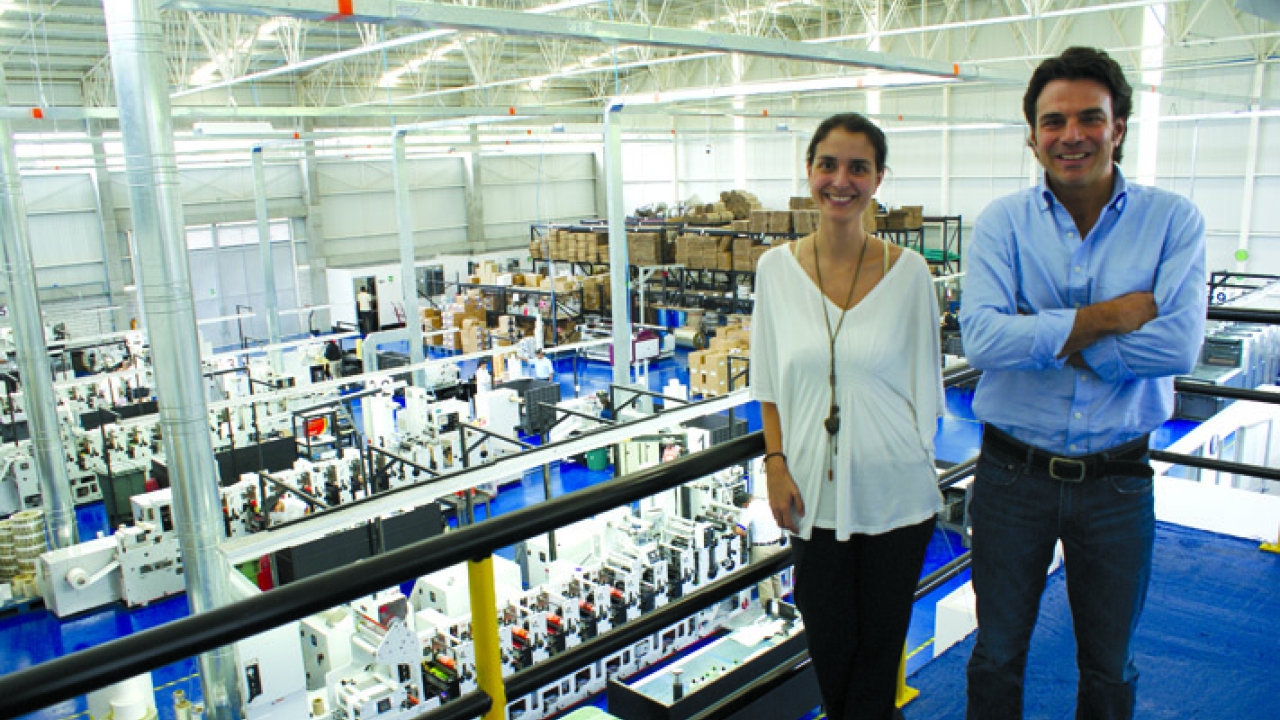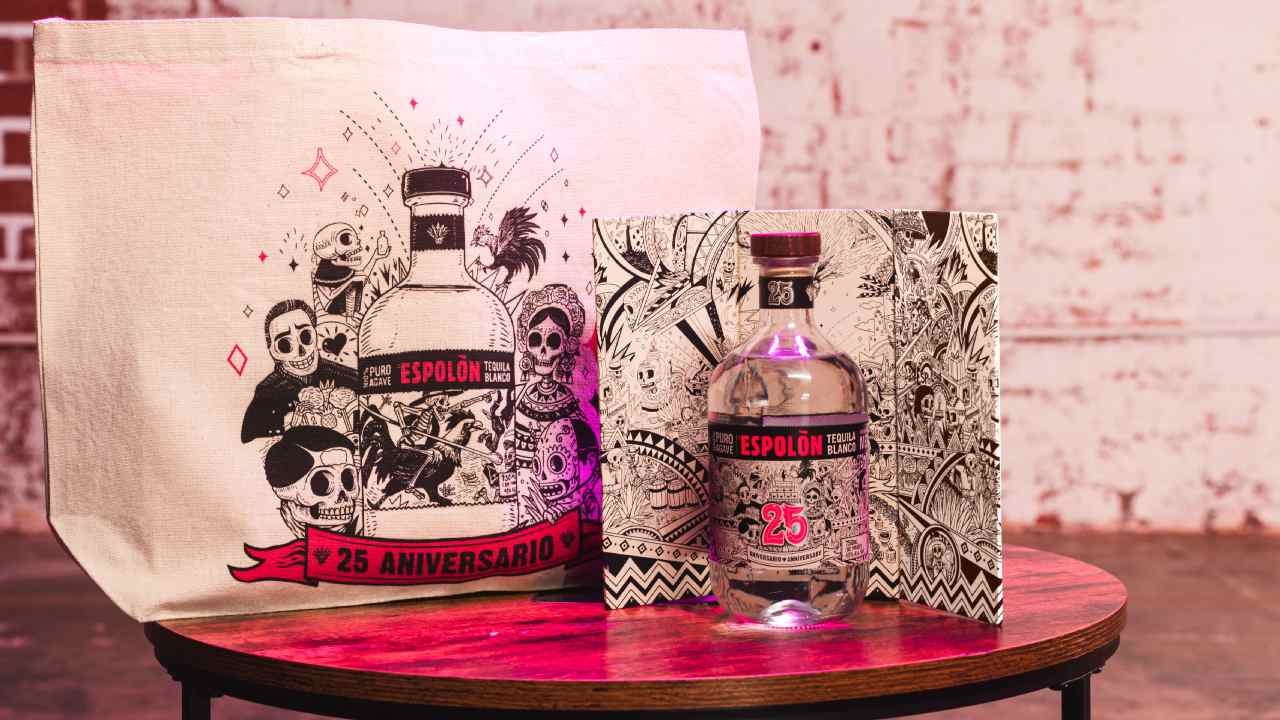Etiflex diversifies into RFID label production

Colombian converter Etiflex already boasts expertise in flexo and offset production of labels and cartons. Now it has added shrink sleeve capabilities and opened an RFID Innovation Center, as James Quirk reports
Etiflex, based just outside Rionegro in Colombia’s Antioquia region, has diversified into shrink sleeve and RFID label production as it seeks to reinforce its position as one of the country’s leading converters.
The company recently opened an RFID Innovation Center in partnership with system integrator Kereon RFID Solutions – a development which follows Etiflex’s move into shrink sleeve label production last year as it continues to diversify its product offering.
Founded in 1983 as a printer of simple pricing labels and distributor of handheld applicators from German company Meto, Etiflex began to serve Colombia’s booming textile market with the installation of a Mark Andy 830 flexo press in 1988.
By 1995, the number of 830s at the company had risen to five. Three years later, Etiflex began the process of replacing all but one of the 830s with four Mark Andy 2200s.
These 8-color UV flexo presses – equipped with inline inspection, cold foiling and lamination, and complemented by a battery of offline rewinders – carry out 60 percent of the company’s work, producing self-adhesive labels for food, home care and textile applications. The presses are of 10in web width with the exception of the most recently installed machine – a 13in Mark Andy 2200 brought in last year, which additionally boasts corona treatment and hot stamping.
An in-house pre-press department handles film plate production, while external suppliers are employed for CtP.
Flexo label printing is complemented by Etiflex’s offset division, which handles 40 percent of production. Ninety percent of this work is in textile applications – the majority of which is exported to the United States – meaning that combined between flexo and offset, up to 30 percent of the company’s output is dedicated to this market.
According to Alejandro Restrepo, Etiflex’s general manager, the move into offset printing – which began in 1996 – was driven by the company’s textile work as well as the desire to diversify its product offering with folding carton production. Etiflex operates four Heidelberg Speedmasters, two of 2-color and one each of 1- and 4-colors.
At the time of L&L’s visit, the company was considering the purchase of a Mark Andy Performance Series P7 press, and Restrepo says that Etiflex’s loyalty to Mark Andy and Heidelberg within its respective divisions is likely to continue, as it provides uniformity in consumables, is easier for operators, and because ‘clients like the consistency’.
Seeking to diversify and responding to increased demand in the local market, Etiflex moved into shrink sleeve label production last year, in a project lead by commercial director Carolina Correa. A dedicated area within the company’s facility houses shrink sleeve production equipment from China, and Correa reports ‘strong growth’ in the sector within Colombia.
‘Our clients are increasingly requesting shrink sleeve labels,’ she says. ‘Production is dedicated to similar markets served by our self-adhesive label production, such as food and home care, but it allows us to provide a broader offering to our clients.’
RFID Innovation Center
This year has seen a further diversification project, this time into RFID label production. Etiflex recently opened a dedicated RFID Innovation Center at its facility in partnership with system integrator Kereon RFID Solutions.
Present at the inauguration were representatives from the company’s partners in the project: David Pallassini, sales manager at antenna and reader manufacturer Caen RFID; Jan Svoboda, vice president of sales, Americas, and Jose Carlos B Oliveira, South American regional sales manager, of inlay manufacturer Smartrac; Guilherme Villela, project manager, and Celio Cataldi, CEO, of software developer Amplio; Pablo E Rosas, partner business manager, Andean region, at printer manufacturer Zebra; Guillermo Fernandez, manager of smart shelving manufacturer Enmetalica; and Roberto Rossetti of Kereon RFID Solutions.
‘Our objective is to offer an integrated solution in terms of technology,’ says Alejandro Restrepo, ‘as well as the scope to meet our customers’ needs in areas such as logistics, security, process control and others.
‘We are grateful to our suppliers – whose knowledge and experience are recognized globally – for their assistance in this launch.’
Kereon RFID Solutions’ Roberto Rossetti, an Italian based in in Colombia for four years and with 21 years’ experience with RFID, sees great potential in the South American market for the technology.
‘There is more opportunity in South America than in Europe,’ he said, ‘where nowadays there is less production of things like textiles. That type of production is moving to developing markets – such as South America, Asia and North Africa – so RFID technology in turn is following these applications away from Europe.
‘In South America, for example, there is a lower cost of label production and more time to develop the technology because there is less local competition.’
Rossetti says there is huge interest in RFID in Colombia, and estimates that some 100 million RFID labels are produced annually in the country by Kereon’s clients, mainly in textiles and logistics. He sees further potential in pharmaceuticals and healthcare products.
The company is currently implementing RFID technology in 140 stores throughout Latin America for Colombia-based retailer Cristal Vestimundo.
The partnership between Etiflex and Kereon allows the system integrator to use the RFID Innovation Center as a showroom for its technology.
‘Etiflex is one of the first companies in Latin America to have a different vision for the label, as we do,’ said Rossetti, who describes the label as a product’s passport. ‘You need technical expertise, but creativity and vision are just as important.’
The respect is mutual, with Alejandro Restrepo describing Rossetti as an ‘RFID guru’. Indeed, Kereon’s expertise is impressive: the company can embed tags into a wide variety of products and materials – including leather, plastic and silicon – as well as into hang tags and adhesive labels.
‘We bring the know-how,’ says Rossetti, who has previously worked on RFID projects for Nike in India. ‘It is European technology but made in Colombia for the local market.’
Colombian growth
Alejandro Restrepo is optimistic about the local label market, which, as reported in recent editions of this magazine, is experiencing rapid growth. He cites personal care applications as a particularly strong growth area.
‘There is huge investment and growth in the label sector in Colombia at the moment,’ he says. He believes that the free trade agreement between Colombia and the United States has had ‘a big impact’. ‘It brings more investment from the US and means that long-term partnerships can be created.’ Colombia’s main port of Cartagena is just three hours from Miami, and Etiflex’s exports to that market are rising.
To accommodate this growth and increase its capacity, Etiflex moved into a new 2,400 square meter facility last year, just outside Rionegro. The setting is rural and the company employs many people from the local community, of which it is fiercely proud.
The company is currently installing a customized software package, developed in-house, which will streamline production, link departments and allow on-demand access to company data.
Restrepo reveals that the local Antioquia government is demanding with regards to environmental issues, and the company is improving its sustainability by not using solvents and through certification to ISO 9001. Government officials visit Etiflex every month to inspect progress. Material manufacturer Arclad, based nearby, removes Etiflex’s matrix waste and reuses it in a pulp molding process to make cardboard trays for eggs and drinks (see L&L issue 4, 2012).
With a booming local market and a diversified product offering, Etiflex is well placed for continued success.
Supplier partnership
Etiflex enjoys a close relationship with material manufacturer Arclad – also based in Colombia’s Antioquia region – from which it buys the bulk of the 400,000 square meters of materials it converts every month.
The companies joined forces to create a customized material for labels for Etiflex client Fábrica de Calcetines Crystal, one of the largest producers of socks in the world.
After four months of development, including extensive testing on Fábrica de Calcetines Crystal’s automated packaging machines from Italian company Autotek, the partnership produced a 160g paper with textile adhesive and glassine liner for exclusive use by the sock manufacturer.
Cooperation between Arclad and Etiflex additionally produced a further exclusive material for the same client, which is employed in Fábrica de Calcetines Crystal’s bulk packs of socks.
Pictured: (L-R) Carolina Correa, commercial director, and Alejandro Restrepo, general manager, at Etiflex’s facility in Rionergo, Colombia
This article was published in Labels & Labeling issue 6, 2012
Stay up to date
Subscribe to the free Label News newsletter and receive the latest content every week. We'll never share your email address.


